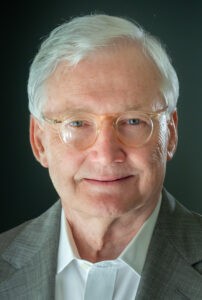Now that headline is a mouthful, but it feels like a way forward for congregational life today. That may be too many labels.
The story is told of a rancher in Texas showing a friend his huge spread which combined 10 ranches he had acquired. His friend was amazed and asked him the name of his new ranch. The rancher replied, “It’s called the Circle Q, Rambling Brook, Double Bar, Crooked Creek, Golden Horseshoe, Lazy B, Bent Arrow, Sleepy T, Triple O Ranch!”

Stephen Shoemaker
“Wow,” his friend replied. “I bet you have a lot of cattle.”
“Not too many,” said the rancher
“Why not? asked the friend.
The rancher replied, “Not many survive the branding.”
Nevertheless, for the church today, I believe all the modifiers are important and cohere. Thankfully, we don’t have to brand anyone or anything.
Post-evangelical
The first modifier is, reluctantly, “post-evangelical.” I know not what else to call it. I love the Greek word that “evangelical” comes from, euangelion, which means literally good news or gospel.
After the Protestant Reformation in Europe, it stood for gospel-centered, grace-centered, Jesus-centered denominations and churches, as today in the main branch of Lutheran churches in America, the Evangelical Lutheran Church in America.
Growing up Baptist in the South, we did not use the term “evangelical” much, but we were evangelical in this sense: Our faith was centered on a relationship with Jesus Christ. It was less doctrinally oriented than other forms.
“Our ‘evangelism’ focused on personal conversion yet neglected Jesus’ preaching on the kingdom of God and the transformation of society.”
Our “Christ in us” emphasis often, however, neglected the larger dimension of being “in Christ,” part of his realm of justice, joy and healing, a realm that transcended the individualistic dimension of the faith. Our “evangelism” focused on personal conversion yet neglected Jesus’ preaching on the kingdom of God and the transformation of society. Maybe we were half-evangelical.
So why “post-evangelical”? Tragically for evangelical faith, the word “evangelical” today has become more a political marker than spiritual one and carrying with it a worldview they call biblical but marked by authoritarianism, dominance over women, the demonizing of LGBTQ people, white supremacy and Christian nationalism. A post-evangelical faith can offer a Jesus-centered, gospel-centered, grace-centered spirituality and ethics that treasures what is just, good, beautiful, compassionate and peaceable.
Ecumenical
Now to the word “ecumenical.” It is not in our regular vocabulary, but it is a word of great moral and spiritual beauty. It comes from the New Testament word, oikumene, which means the whole inhabited earth as the household of God. What if we lived that way, as if the whole world were the household of God — animal, plant, the waters and land and us latecomers, the human creature, all part of the one household of God? How might it shape the way we live with others and with God’s earth?
The ecumenical movement began more than 100 years ago to address the scandal of a badly divided Christianity and unite Christians around the world that Christianity might better represent the oneness of the body of Christ and fulfill the prayer Jesus is still praying for us, “That they may be one.” Out of spiritual pride, Southern Baptists refused to join the ecumenical movement and all its organization — and sometimes condemned it. Enough of such foolishness. A Baptist congregation as any congregation may be ecumenical in spirit and action.
“Today we are called to a deeper ecumenism.”
Today we are called to a deeper ecumenism, a working desire for unity among all Christians and spiritual friendship with other religions. Catholic theologian Hans Kung said in the late 1910s words which are ever more urgent today: “The prerequisite of peace among the nations is peace among religions.”
We can follow Mother Teresa who said: “I love all religions. I am in love with my own.” The history of salvation belongs to all people, not just the Jewish and Christian histories.
Ecumenical also means this: If the world is the household of God, then we are called by God to be stewards of God’s world, caretakers of earth, home economists in the Great Economy and home ecologists in the Great Ecology.
The worldwide ecumenical movement has waned a bit, but we can foster a new and deeper ecumenism on a local level and be witnesses to the oneness of God.
Baptist
Now to “Baptist.” Let’s spell it, as theologian James Wm. McClendon urged, with a little “b,” so better to represent our beginnings and identity as a dissenting, sometimes radical, decidedly pacifist, oft-persecuted people willing to be a minority witness that eschewed the way of spiritual domination. I speak of being a church in the baptist tradition because it represents a way of being Christian and being church that transcends denominational structures.
Here are some deep principles of the baptist way. They need re-articulation today, a way of being baptist in a “new key.”
I begin with what we have called “believers’ baptism.” Some baptist churches today are accepting people as members who have been baptized in other baptism traditions, including infant baptism. Such is an ecumenical gesture of real importance. They practice believers’ baptism by immersion as their major practice yet honor all baptisms. Some baptist congregations accept members based on their statement of faith without requiring baptism, perhaps as Paul wished to admit Gentiles into the church without requiring circumcision.
I have affirmed this practice, but such a position should be carefully thought through and articulated by the church. For example, if a person wishes to join without baptism are they offered an opportunity to learn about baptism and its meanings and consider its validity for their lives?
“It is time for a baptismal renewal movement among us.”
It is time for a baptismal renewal movement among us. We need to teach what it means to live with a baptismal imagination and celebrate the ordinance, or sacrament, as early English baptists called it, with joyful intentionality. We need to revel in the multiple meanings of baptism for the Christian life, among them, following Jesus, being the beloved, naming Jesus “Lord,” turning and entering the kingdom of God, the washing away of sin, new birth and new creation, anointing and calling, belonging to a family of faith, dying and rising as people and resurrection and eternal life.
The second principle, what the early baptists called soul competence and soul liberty. In a time when some prominent Southern Baptist churches are requiring the signing of documents requiring certain doctrinal and moral positions as a condition of membership, we need to champion the radical nature of the freedom of individual conscience. It’s part of the baptist way. It says that every person is competent to open the Bible and, led by the Spirit, interpret the Bible for his or her own life and faith and, if competent, must be free.
A third principle is local church autonomy. It follows the same principle as above: Every congregation is competent to open the Bible and, led by the Spirit, interpret it for its life and faith and, if competent, must be free.
And the last is the principle that preserves the spiritual freedom of all churches and religions in our nation and which is hanging on by a thread today because of its assault by certain kinds of Baptists and Catholics and evangelicals. It is religious liberty and the separation of church and state.
The peril is real. The First Amendment of the U.S. Constitution on freedom of religion is being interpreted so as to make it almost unrecognizable. This principle may be the most important baptist contribution to the welfare of our nation.
A terrible thing happened to the mind of Baptists in the South when we became the majority religion of the South. We lost our sense of being a minority witness to the dangers of majoritarian religion and the spiritually corrosive nature of the marriage of church and state. And now, remarkably, we see the rise of theocratic fever dreams for our nation led by many leaders of the Southern Baptist Convention, the overlords of a once free baptist people.
So the way forward may be in the revitalization of churches willing to be brave in the midst of the formidable challenges of being Christian in America and trying on for size the meaning of being a post-evangelical, ecumenical church in the baptist tradition.
Stephen Shoemaker serves as pastor of Grace Baptist Church in Statesville, N.C. He served previously as pastor of Myers Park Baptist in Charlotte, N.C.; Broadway Baptist in Fort Worth, Texas; and Crescent Hill Baptist in Louisville, Ky.


